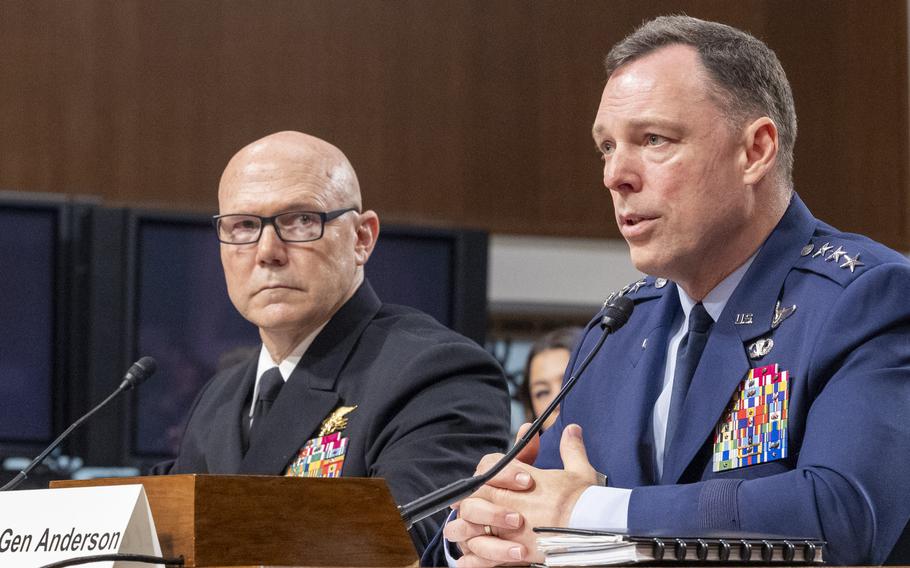
Navy Vice Adm. Frank Bradley, left, and Air Force Lt. Gen. Dagvin R.M. Anderson testify Tuesday, July 22, 2025, during a Senate Armed Services Committee confirmation hearing. Bradley is nominated to be commander of U.S. Special Operations Command. Anderson is nominated to be commander of U.S. Africa Command. (Eric Kayne/Stars and Stripes)
WASHINGTON — Members of the Senate Armed Services Committee voiced concerns Tuesday over the Trump administration’s reductions to diplomatic initiatives and foreign aid, arguing the cuts will hamper the work of commanders nominated to lead U.S. troops in Africa and special operations forces.
The senators, mostly Democrats, said they were worried the dismantling of the humanitarian assistance agency USAID, a downsizing of the State Department and other efforts to retreat from America’s global engagement would create a vacuum, especially in Africa, that competing powers such as China and Russia would fill.
“For decades, we have relied upon our State Department diplomats and... USAID to develop deep, lasting relationships in Africa that can outlast China and Russia’s coercion,” said Sen. Jack Reed of Rhode Island, the top Democrat on the panel. “I am deeply concerned that our ‘soft power’ leadership in Africa has been significantly undermined over the past several months.”
Misgivings about the cuts repeatedly surfaced at the committee’s confirmation hearing for Air Force Lt. Gen. Dagvin R.M. Anderson, who is nominated to lead U.S. Africa Command, and Navy Vice Adm. Frank Bradley, the nominee to lead U.S. Special Operations Command.
Anderson now serves as the director for joint force development of the Joint Staff while Bradley is the commander of Joint Special Operations Command.
“You’re going to have diplomatic duty, whether you signed up for that or not,” Sen. Angus King, I-Maine, told Anderson. “You’re going to have to build relationships, not necessarily strictly military, but with the local governments and the local leadership.”
King described the disbanding of USAID in particular as “one of the greatest geopolitical mistakes in my lifetime.”
Anderson did not comment on President Donald Trump’s policy moves but said he worked extensively with the State Department, USAID and non-governmental organizations when he commanded special operations forces in Africa and recognized their strategic impact.
“These programs are important as long as they provide for the security and prosperity of our nation,” Anderson said, referring to USAID and a global program to combat AIDS. “I think as we target those in key areas, they can help build stability in key regions.”
Committee chairman Roger Wicker, R-Miss., asked Anderson how Moscow and Beijing would respond if the U.S. were to abandon its foreign-aid engagements — “I think they’d be celebrating, would they not?”
“I know that if there’s opportunities, they will seize them,” Anderson said.
He said Africa was increasingly at the center of a great-power rivalry and is seeing more activity from China, which is expanding its military footprint on the continent, and Russia, which seeks to destabilize the continent through disinformation campaigns.
“Both of those nations see their futures running through the continent,” Anderson said.
If confirmed, he said he would look at “creative ways” to build relationships in Africa and suggested economic investments through private firms could provide opportunities for engagement as the continent’s population rises.
“One of the things that AFRICOM is positioned well to do is to convene people to have these discussions, understanding we provide the military aspect of it,” Anderson said. “We can provide a venue to bring folks together to look at the security implications of these investments.”
Bradley expressed confidence that meaningful ties could still be forged amid budget cuts. He acknowledged the “important capability” provided by American diplomats and aid providers but said he also recognized the difficulty of managing competing budgetary priorities.
“However the distribution of those tasks and those efforts are made, we will continue to work with them closely to make sure we bring the best combination of those levers and tools to bear,” he said.
The Trump administration’s effort to slash federal spending and rein in the size of the government includes a significant overhaul of the State Department, which Secretary of State Marco Rubio has derided as too bloated, costly and ideological.
Congress last week approved the administration’s request to claw back about $8 billion in foreign assistance and is weighing a budget request to virtually eliminate funding for the U.S. Agency for Global Media that provides news to parts of the world with little press freedom.
Sens. Tim Kaine, D-Va., and Mark Kelly, D-Ariz., said they feared the U.S. was leaving a void in the information space and risked allowing Russia, China and Iran to spread their influence.
Some Republicans on Tuesday objected to the line of questioning by Democrats, defending the administration’s cuts to USAID and other programs as in the best interests of the United States.
“There are smart things to do that aren’t just about blowing things up and killing people but that has been crowded out with a mission creep in this wandering foreign policy that just believes that we can just do all this do-gooding stuff around the world,” said Sen. Eric Schmitt, R-Mo.
Sen. Tim Sheehy, R-Mont., a former Navy SEAL officer, said the ability to project economic power and stability is important but nothing will ever supersede American military might.
“The real power projection is when we can display to the world that we are going to protect our interests and our people ruthlessly, no matter what,” he said. “That is what the real power projection, the U.S. military is about.”